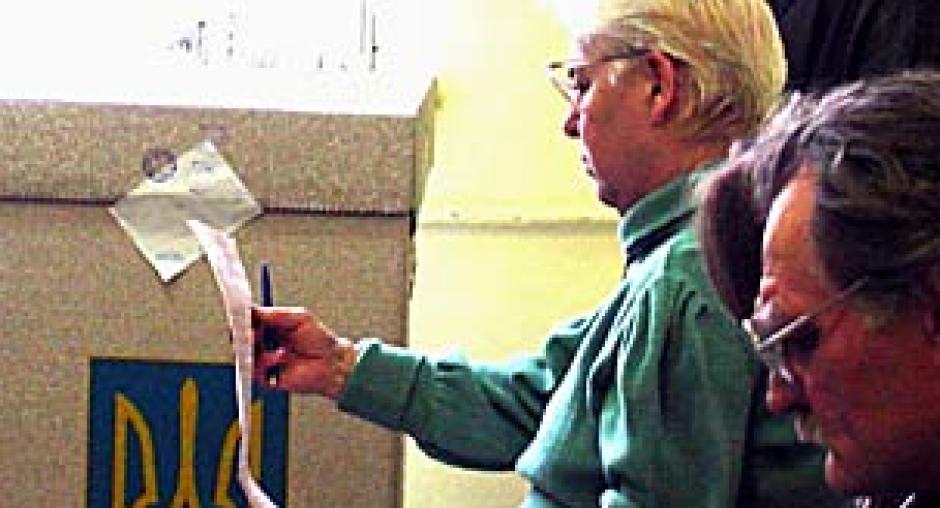Newsroom
Recent parliamentary elections bring Ukraine closer to international standards
KYIV 13 May 2002

(Jens Eschenbaecher/OSCE)A voter studies the ballot paper before voting during the
Ukrainian
parliamentary elections, Kyiv, 31 March 2002. (Jens Eschenbaecher/OSCE) Photo details
KYIV, 13 May 2002 - The 31 March parliamentary elections brought Ukraine closer to meeting international commitments and standards for democratic elections, concluded the International Election Observation Mission (IEOM) after a three-day follow-up visit to Kyiv on 9-11 May. The IEOM returned to Ukraine to review the crucial post-election phase and to formulate its final conclusions.
The post-election period marked important progress over the 1998 parliamentary elections, in particular the transparent publication of the detailed results. The enhanced legal framework prevented repeated appeals and endless election disputes that characterized previous elections. However, due to tight legal deadlines, this process emphasized speedy, rather than judicious, resolution of complaints. The Central Election Commission continued to function efficiently, but more effective oversight of lower commissions is required. The Supreme Court operated with a degree of independence, providing complainants with a viable option for appeals and redress.
The conduct of these elections and the active engagement of civil society in the process marked a step forward in Ukraine's democratic transition. While Ukraine met in full or in part a number of commitments such as universality, transparency, freedom and accountability, it failed to guarantee a level playing field, an indispensable condition to ensure the fairness of the process. The authorities did not provide all contestants equal opportunities to conduct their election campaign. Also, the media did not provide a balanced coverage. As regards election day procedures, technical improvements are needed to protect the secrecy of the ballot and to offer an orderly and dignified process to the voters.
The IEOM consists of delegations from the Parliamentary Assemblies of the OSCE and the Council of Europe, the European Parliament, and the OSCE Office for Democratic Institutions and Human Rights (ODIHR). During the visit, the Mission met with the President, Speaker of Parliament, Minister of Foreign Affairs, Chairman of the Central Election Commission, Supreme Court, representatives of political parties, and the diplomatic community.
In constructive discussions, interlocutors acknowledged the IEOM's findings and conclusions and welcomed further cooperation with the international community to remedy the weaknesses and to build on the strengths of the electoral process in Ukraine, in particular in view of the presidential elections in 2004. The institutions represented in the IEOM expressed their commitment to assist the authorities and civil society in further strengthening the democratic process in the country. The OSCE/ODIHR will publish a comprehensive report with detailed recommendations by the end of May.
The post-election period marked important progress over the 1998 parliamentary elections, in particular the transparent publication of the detailed results. The enhanced legal framework prevented repeated appeals and endless election disputes that characterized previous elections. However, due to tight legal deadlines, this process emphasized speedy, rather than judicious, resolution of complaints. The Central Election Commission continued to function efficiently, but more effective oversight of lower commissions is required. The Supreme Court operated with a degree of independence, providing complainants with a viable option for appeals and redress.
The conduct of these elections and the active engagement of civil society in the process marked a step forward in Ukraine's democratic transition. While Ukraine met in full or in part a number of commitments such as universality, transparency, freedom and accountability, it failed to guarantee a level playing field, an indispensable condition to ensure the fairness of the process. The authorities did not provide all contestants equal opportunities to conduct their election campaign. Also, the media did not provide a balanced coverage. As regards election day procedures, technical improvements are needed to protect the secrecy of the ballot and to offer an orderly and dignified process to the voters.
The IEOM consists of delegations from the Parliamentary Assemblies of the OSCE and the Council of Europe, the European Parliament, and the OSCE Office for Democratic Institutions and Human Rights (ODIHR). During the visit, the Mission met with the President, Speaker of Parliament, Minister of Foreign Affairs, Chairman of the Central Election Commission, Supreme Court, representatives of political parties, and the diplomatic community.
In constructive discussions, interlocutors acknowledged the IEOM's findings and conclusions and welcomed further cooperation with the international community to remedy the weaknesses and to build on the strengths of the electoral process in Ukraine, in particular in view of the presidential elections in 2004. The institutions represented in the IEOM expressed their commitment to assist the authorities and civil society in further strengthening the democratic process in the country. The OSCE/ODIHR will publish a comprehensive report with detailed recommendations by the end of May.
